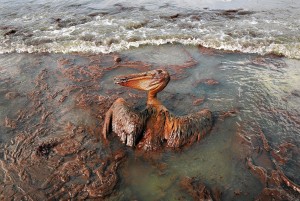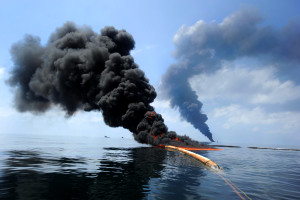Deepwater Horizon Oil Spill Actions Initiated to Prevent Future Incidents From Occuring Again
The other day, in oceanography course, we watched a documentary on the Deepwater Horizon Oil Spill, also usually referred to equally the BP oil spill that occurred back in 2010. I was a freshman in loftier schoolhouse then and I definitely retrieve hearing almost information technology in the news, only I had no idea how horrific the incident actually was. I sabbatum in my seat in 100 Thomas completely appalled at what I was watching. Today, I want to remind you lot all well-nigh some of the details surrounding the ending and pose an interesting question: is it a worthwhile gamble to install deep-water oil wells in the Gulf of United mexican states given the fallout of this disaster?
The BP oil spill was the deepest and largest accidental oil spill in history, occurring one mile beneath the surface on Apr 20th, 2010 at 9:45 pm. Information technology took identify off of the Gulf of United mexican states in a role of the ocean called the Deepwater Horizon. Petroleum oil flowed into the ocean at an astonishing rate of 840,000-ane,700,000 gallons per day for 87 days until the menstruum was successfully stopped.

You might be wondering why it took and then long to successfully stop the catamenia of oil. Oil spills or incidents of oil rigs catching on fire are not uncommon, however standard procedure only accounts for spills at the surface. The challenge with the Deepwater Horizon was that the leakage occurred 1,500 meters underwater; the floating drilling platform caught on fire at the surface only sank past Apr 22nd and continued to leak. Considering deepwater releases were poorly understood, there were many misconceptions that came forth with the attempted clean upwardly procedures. Some of these, for example the usage of toxic dispersants at the source underwater, effectively reduced the full loading of oil into surface waters and the shore, but also brought serious negative consequences for scientists trying to empathise the fate of the oil in the ocean'due south limerick and ecosystems.

Basically, the 87 days the rig leaked oil consisted of hectic attempts of teams of BP officials, engineers, and oceanographers to effort anything and everything, including things that had never been tested before, to terminate the flow of oil into the Gulf of United mexican states. It is estimated that BP spent 6 million dollars per day on cleanup efforts. Not only was the ocean harmed by this blow, but as well the United States lost enormous amounts of one of our most important resources.
The backwash of the Deepwater Horizon Oil Spill notwithstanding echoes today. While the bulk of it could be cleaned up, those efforts took up incredible amounts of time and money. Beaches were spoiled, resulting in a loss of many turtles and birds that habituate costal areas, fisheries were shut down, and marine life of all trophic levels experienced unfavorable changes in their environment.

Given the devastation of this disaster, I've been thinking nigh whether or not it is worthwhile to install deep-water wells for oil extraction. Currently, about i/3 of the oil and gas being extracted comes from off-shore sources. I wholeheartedly support conserving our surroundings, but thinking realistically, I don't see how we can only cut out this much of our oil sources. I wrote about alternative free energy sources last week, and although they are a useful supplement to our current free energy dependency on oil, there is no mode it tin even begin to supercede it. I have hope that a deep-water spill of this magnitude will never happen again because as a society we must learn from our mistakes. The Deepwater Horizon Oil Spill was a learning moment: because of it, the oil industry now has information about how to stop such a spill and how to prevent it from happening in the starting time place. Many congressional hearings have occurred since 2010 to sympathize how legislation can exist improved for large oil spills in the hereafter.
I would dearest to hear your opinions on this matter. Annotate below: is it a worthwhile risk to install deep-water oil wells in the Gulf of Mexico given the fallout of this disaster?

Source: Graham, William Thousand. Oceanography and the Deepwater Horizon Oil Spill. Belmont, CA: Brooks/Cole, Cenage Learning, 2012. Print.
Source: https://sites.psu.edu/rclmltsp15/2015/04/09/ci-environment-opinions-wanted-on-the-deepwater-horizon-oil-spill/
0 Response to "Deepwater Horizon Oil Spill Actions Initiated to Prevent Future Incidents From Occuring Again"
Post a Comment